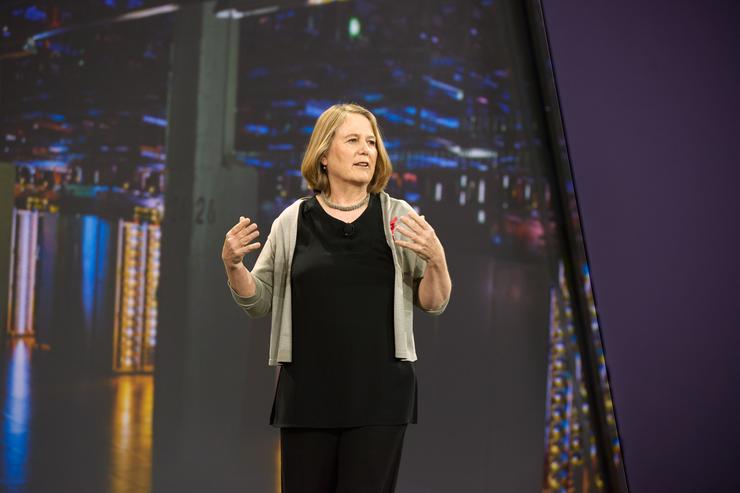
Diane Greene - Senior Vice President, Google Cloud
The vendor has moved beyond table stakes functionality however, and has developed differentiating leadership in machine learning and analytics, security, application developer tools and connected business platforms.
Of the differentiators, machine learning and analytics are billed as the primary area of leadership for Google Cloud, and the probable driver of 2017 platform uptake.
“As the business looks to win a larger share of the cloud market in 2017, Google Cloud will rely on its investments in accelerating enterprise sales to continue paying off,” Technology Business Research Analyst, Meaghan McGrath, observed.
“And also for partners to help the firm penetrate new markets as Google Cloud more than doubles its global availability regions.”
McGrath said the partnership with Accenture, in particular, will help Google develop and message clear, industry-specific use cases for machine learning and the GCP suite as a whole to improve mind share and drive uptake in specialised segments.
As reported by ARN, Accenture is currently the only provider recognised as a Google specialist across four core areas, spanning app development, data analytics, machine learning and infrastructure.
Alliances
Partnerships will be pivotal for Google in the years ahead, as illustrated through SAP now running its flagship products on GCP.
Designed to develop and integrate Google cloud and machine learning solutions with SAP enterprise applications, the agreement will allow customers to run mission-critical SAP applications and databases, such as SAP HANA, on GCP.
With over 125 million subscribers on the SAP cloud user base, the SAP HANA platform houses over 5,200 start-up developers, alongside more than 560 partners globally.
“With this partnership we’re offering SAP customers the opportunity to leverage Google Cloud to accelerate their digital transformation and convert data into actionable insights and business outcomes,” Google Cloud Head of Global Technology Partners, Nan Boden, said.
Delving deeper, the partnership also includes new G Suite integrations, Google’s machine learning capabilities and data governance collaboration, alongside the availability of SAP Cloud Platform on GCP.
“Machine learning is top of mind for enterprise CIOs and developers alike, and Google is leading the industry to expand access to machine learning’s benefits,” Boden added.
“Google Cloud solutions include APIs covering speech, text, image, translation and infrastructure for large-scale training and delivery of machine learning capabilities.
“Google and SAP intend to collaborate on building machine learning features into intelligent applications like conversational apps that guide users through complex workflows and transactions.”

For Google Cloud to focus on effectively driving enterprise adoption in 2017, the ability to offer compelling machine learning use cases and secure infrastructure expansion will be the key differentiator between success and failure.
Machine learning
Across the board, machine learning and artificial intelligence (AI) have reached a critical tipping point and will increasingly augment and extend virtually every technology enabled service, thing or application.
“Creating intelligent systems that learn, adapt and potentially act autonomously rather than simply execute predefined instructions is primary battleground for technology vendors through at least 2020,” Gartner Vice President of Research, David Cearley, added.
As explained by Cearley, AI and machine learning, which include technologies such as deep learning, neural networks and natural-language processing, can also encompass more advanced systems that understand, learn, predict, adapt and potentially operate autonomously.
“Systems can learn and change future behaviour, leading to the creation of more intelligent devices and programs,” he added.
“The combination of extensive parallel processing power, advanced algorithms and massive data sets to feed the algorithms has unleashed this new era.”
As businesses store and access petabytes of data, they increasingly rely on machine learning and AI to build and run their products and internal processes.
“As a technology reaches more people, it’s impact becomes more profound,” Google Cloud Chief Scientist of Artificial Intelligence AI and Machine Learning, Fei-Fei Li, added.
“This is why the next step for AI must be democratisation, removing the barriers to entry and making it available to the largest possible community of developers, users and enterprises.”
In reaching over one billion users daily, the tech giant will launch GCP in Australia this year, with eight new Google Cloud Regions including Sydney, Mumbai, Singapore, Northern Virginia, São Paulo, London, Finland and Frankfurt.
“Combining the massive reach of this platform with the power of AI, and making it available for everyone, will result in a greater improvement in quality of life from education to manufacturing, and health to retail,” Li added.
“This is why delivering AI and machine learning through Google Cloud is important.”
James Henderson is attending Google Cloud Next ’17 conference in San Francisco as a guest of Google.




